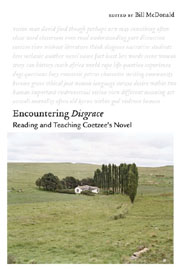Book contents
- Frontmatter
- Contents
- Acknowledgments
- Introduction
- I Reading Disgrace
- 1 “We are not asked to condemn”: Sympathy, Subjectivity, and the Narration of Disgrace
- 2 Beyond Sympathy: A Bakhtinian Reading of Disgrace
- 3 “Is it too late to educate the eye?”: David Lurie, Richard of St. Victor, and “vision as eros” in Disgrace
- 4 Disgrace and the Neighbor: An Interchange with Bill McDonald
- 5 To Live as Dogs or Pigs Live Under Us: Accepting What's on Offer in Disgrace
- 6 Tenuous Arrangements: The Ethics of Rape in Disgrace
- 7 Dis(g)race, or White Man Writing
- 8 Clerk in a Post-Religious Age: Reading Lurie's Remnant Romantic Temperament in Disgrace
- 9 Saying it Right in Disgrace: David Lurie, Faust, and the Romantic Conception of Language
- 10 The Dispossession of David Lurie
- II Reading Disgrace with Others
- Works Cited
- Notes on the Contributors
- Index
8 - Clerk in a Post-Religious Age: Reading Lurie's Remnant Romantic Temperament in Disgrace
from I - Reading Disgrace
Published online by Cambridge University Press: 12 September 2012
- Frontmatter
- Contents
- Acknowledgments
- Introduction
- I Reading Disgrace
- 1 “We are not asked to condemn”: Sympathy, Subjectivity, and the Narration of Disgrace
- 2 Beyond Sympathy: A Bakhtinian Reading of Disgrace
- 3 “Is it too late to educate the eye?”: David Lurie, Richard of St. Victor, and “vision as eros” in Disgrace
- 4 Disgrace and the Neighbor: An Interchange with Bill McDonald
- 5 To Live as Dogs or Pigs Live Under Us: Accepting What's on Offer in Disgrace
- 6 Tenuous Arrangements: The Ethics of Rape in Disgrace
- 7 Dis(g)race, or White Man Writing
- 8 Clerk in a Post-Religious Age: Reading Lurie's Remnant Romantic Temperament in Disgrace
- 9 Saying it Right in Disgrace: David Lurie, Faust, and the Romantic Conception of Language
- 10 The Dispossession of David Lurie
- II Reading Disgrace with Others
- Works Cited
- Notes on the Contributors
- Index
Summary
No, this chronicle of a fall is not written to enlighten. Nor is schadenfreude sufficient to compel a modern reader's descent into the unraveling life of a middle-aged man who will show little inclination to stave off his own disgrace nor much ability to mend its collateral effects — a young woman, his student and his lover, chief among the dire complications. Instead, J. M. Coetzee's Disgrace draws us into unyielding witness of a man's pathetic fall via Coetzee's unwavering gaze. Within this perspective David Lurie is repeatedly exposed: as a professor of Romantic literature marooned in a post-Romantic age — then as an exile from even that reconstituted academy; as a pale intellect in harsh rural post-apartheid South Africa; as a father consigned to the role of roommate; as an amateur composing opera on a banjo. In every case, Lurie presents a quaint and lonely figure who is set upon a vast Modern plain — and who holds little hope of rescue or even self-preservation. At times the prospect is unbearable. I would rather close the covers of the book on him than face an exposed and vacant Lurie dangling the props of Romanticism — its poetry, its promises of transcendence — as lures in his parlor seductions. I would much rather hear his bloodied confession confirm my prejudices than watch him defend the contents of his heart at the secular tribunal assembled to judge his indiscretion.
But Disgrace itself operates not in judgment but in inquiry.
- Type
- Chapter
- Information
- Encountering 'Disgrace'Reading and Teaching Coetzee's Novel, pp. 148 - 172Publisher: Boydell & BrewerPrint publication year: 2009

